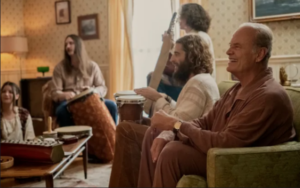JESUS REVOLUTION: 3 STARS. “faith-based movie about embracing outcasts.”
 Based on American author and pastor Greg Laurie and his book “Jesus Revolution,” the movie of the same name, now playing in theatres, is a late 1960s period piece starring Kelsey Grammar as a “square” Southern Californian pastor who embraces the era’s love and peace mantra—and the hippies who espouse it—despite the objections of his church’s elders.
Based on American author and pastor Greg Laurie and his book “Jesus Revolution,” the movie of the same name, now playing in theatres, is a late 1960s period piece starring Kelsey Grammar as a “square” Southern Californian pastor who embraces the era’s love and peace mantra—and the hippies who espouse it—despite the objections of his church’s elders.
When we first meet pastor Chuck Smith (Grammer) he’s very much an older man of his time. He’s befuddled by the new generation, and even his teenage daughter says he is “the very definition of square.” According to Chuck, hippies have “cast off authority, tradition, morals, cast off God,” and he wants nothing to do with them.
“When God walks in here and brings me a hippie,” he says. “I’ll ask him what it is all about.”
No sooner have the words spilled from his lips that the doorbell rings. On the stoop is Lonnie Frisbee (Jonathan Roumie), a long-haired, charismatic hippie street preacher who says he is often told he looks like Jesus.
With Frisbee comes a message of tolerance, love and the seeds of a Jesus youth Movement, which Time magazine called “The Jesus Revolution” in a June, 1971 cover story.
“God is saving the hippies,” says Frisbee, “and it is blowing everyone’s mind because nobody thought the hippies could be saved.”
Meanwhile, a lost teen from a broken home named Greg Laurie (Joel Courtney) is seeking liberation in the counterculture movement of Southern California. His life is revolutionized when his spiritual journey brings him into the sphere of Smith and Frisbee.
Set to a soundtrack of rock hits like “Jesus Is Just Alright with Me,” “Jesus Revolution” is a faith-based movie about embracing outcasts, searching for meaning and stirring up the status quo with love and acceptance. It’s an unabashedly feel-good story that unfolds quickly, without ever missing an opportunity to use a “far out” Boomer cliché to establish the time and place.
“Jesus Revolution” is at its best in the first hour. Once past Smith’s “I hate hippies” phase Grammar has several heartfelt scenes that give the story’s message of acceptance some real gravitas.
The story wanders into the wilderness when dramatic conflict, like Frisbee’s clash of ego with Smith—“Not everything needs to be a spectacle,” Smith scolds.—and Laurie’s romantic and familial issues take center stage. All stories need some sort of clash to maintain interest, but after an hour of peace and love, it feels forced.
“Jesus Revolution” is a very earnest film, with a strong point of view, that values uplift above all else.
